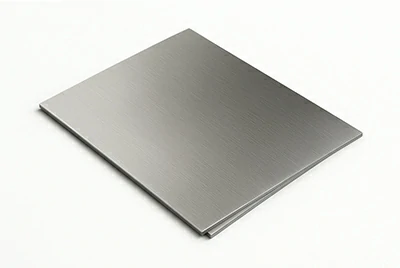
Grade 23 titanium sheet
This ELI-grade titanium alloy for medical and aerospace applications features extra-low interstitial elements (ELI) for enhanced fracture toughness and weld joint reliability. Compliant with ASTM F136, ISO 5832-3, AMS 4907, and ASTM B265, it's available in stock and custom cuts.
Technical parameters and performance indicators
Industry Standards & Certifications
Grade 23 Titanium Sheet (Ti-6Al-4V ELI) strictly adheres to international standards and is suitable for use in critical industries such as medical, aviation, and chemicals. We provide Material Traceability Certificate (MTC) and batch traceability documentation to help customers quickly complete compliance verification.
- ASTM B265 / ASME SB-265: Specification for Titanium and Titanium Alloy Plate, Strip, and Sheet
- AMS 4907: Standard for Ti-6Al-4V ELI Plate for Aerospace Applications
- ASTM F136: Wrought Ti-6Al-4V ELI for Surgical Implants
- Mil-T-9046: Military Specification for Titanium Alloy Sheet, Strip, and Plate (Includes Ti-6Al-4V ELI Plate)
- ISO 5832-3: Medical Implant-Grade Titanium Alloy Materials
- UNS R56401: International Unified Designation
Grade 23 Titanium Chemical Composition
Grade 23 is a Ti-6Al-4V ELI alloy. While maintaining 6% Al and 4% V, it reduces extra-low interstitial elements (ELI) such as oxygen, nitrogen, carbon, and hydrogen, resulting in improved toughness and biocompatibility.
| Elements | Content (wt.%) |
|---|---|
| Aluminum (Al) | 5.50 – 6.50 |
| Vanadium (V) | 3.50 – 4.50 |
| Iron (Fe) | ≤ 0.25 |
| Carbon (C) | ≤ 0.08 |
| Oxygen (O) | ≤ 0.13 |
| Nitrogen (N) | ≤ 0.03 |
| Hydrogen (H) | ≤ 0.0125 |
| Other (Each) | ≤ 0.10 |
| Other (Total) | ≤ 0.40 |
| Titanium (Ti) | Balance |
Compared with Grade 5, ELI has lower impurities and more reliable fracture toughness and weld joint performance.
Grade 23 Titanium Physical Properties
As a high-performance material that combines lightweighting with corrosion resistance, Grade 23 titanium plate also exhibits excellent physical properties:
| Performance Indicators | Values |
|---|---|
| Density | 4.43 g/cm³ |
| Elastic Modulus | 105 – 114 GPa |
| Melting Point | 1600 – 1660 °C |
| Thermal Conductivity | 6 – 7 W/m·K |
| Coefficient of Thermal Expansion (CTE) | 8.6 – 9.0 µm/m·K |
- Low density, high modulus, lightweight yet strong
- Excellent thermal stability, suitable for low and variable temperature environments
Mechanical Properties of Ti-6Al-4V ELI Titanium
In the annealed state (ASTM B265/AMS 4907), Grade 23 titanium plate exhibits excellent strength and ductility, balancing toughness and durability:
| Performance Specifications | Values |
|---|---|
| Ultrasonic Strength (UTS) | ≥ 120 ksi (827 MPa) |
| Yield Strength (0.2% YS) | ≥ 110 ksi (759 MPa) |
| Elongation (2") | ≥ 10% |
| Hardness | ~310 HV |
| Fatigue Strength (10⁷ cycles) | 590 – 670 MPa |
| Bend Test | Thickness ≤ 4.75 mm, can be cold bent 105° at 4.5T radius without cracks |
- High strength and high toughness, suitable for fracture control components and medical implants
- Stable fatigue performance, meeting the long-term service requirements of aerospace applications
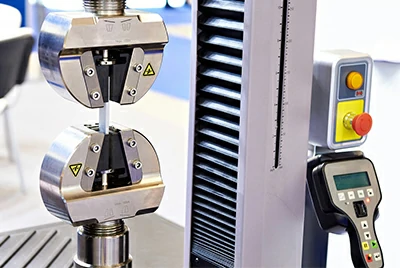
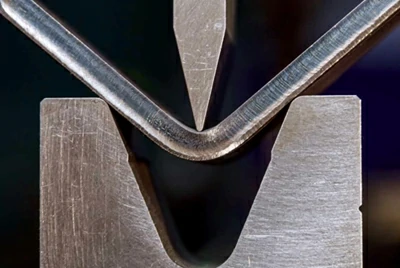
Product Specifications
Grade 23 Titanium Sheet (Ti-6Al-4V ELI) offers a full range of thicknesses and sizes to meet the diverse needs of medical, aerospace, and industrial projects. Common sizes are in stock, and custom cutting and sample delivery are available.
Size Range
| Category | Thickness | Width | Applications |
|---|---|---|---|
| Sheet | 0.5 – 4.75 mm | ≤1219 mm | Commonly used in medical and chemical components; aviation structural parts, pressure vessels; large load-bearing components, and offshore equipment |
| Plate | 5 – 50 mm | ≤2500 mm | Applications |
| Heavy Plate | 50 – 120 mm | ≤3000 mm | Commonly used in medical and chemical components; aviation structural parts, pressure vessels; large load-bearing components, and offshore equipment |
Tolerances and Surfaces
| Items | Requirements |
|---|---|
| Thickness Tolerance | Meets ASTM B265 specifications |
| Width/Length Tolerance | According to ASTM/EN precision grades |
| Flatness | ≤0.2 mm/m |
| Surface Condition | Acid-washed, bright, or mill finish available |
Availability
| Project | Description |
|---|---|
| Delivery Status | Annealed |
| Available Format | Whole boards, cut boards, and sample sheets |
| Quality Documents | Material certification (EN 10204 3.1 MTC), optional third-party test report |
Material Comparison: Grade 23 vs Grade 5
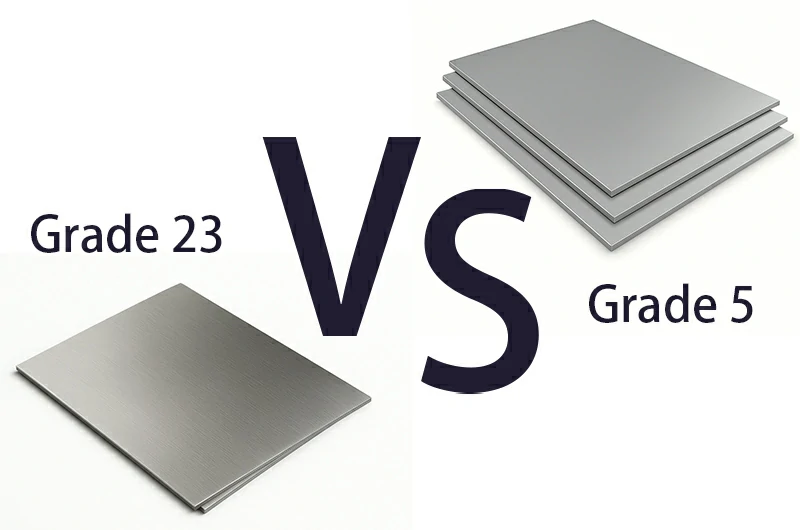
| Item | Grade 23 (Ti-6Al-4V ELI) | Grade 5 (Ti-6Al-4V) |
|---|---|---|
| UNS Number | R56401 | R56400 |
| Composition Control | ELI, lower O/N/C/H content | General definition, with a higher limit for interstitial elements |
| Ultrasonic Tensile Strength (UTS) | ≥ 827 MPa (120 ksi) | ≥ 895 MPa (130 ksi) |
| Yield Strength (YS) | ≥ 759 MPa (110 ksi) | ≥ 828 MPa (120 ksi) |
| Elongation | ≥ 10% (improved toughness) | ≥ 10% |
| Fracture Toughness | High | Medium |
| Fatigue Strength | Excellent, suitable for long-term service | Standard |
| Biocompatibility | Excellent (medical grade ASTM F136 / ISO 5832-3) | Good, but not for medical use |
| Typical Applications | Medical implants, aerospace fracture control components, cryogenic containers | General aerospace structures, automotive parts, and industrial applications |
- Grade 23 titanium plate is purer and safer, suitable for medical, aerospace fracture control, and cryogenic applications.
- Grade 5 titanium plate is slightly stronger but contains more impurities, making it suitable for general aerospace and industrial structural parts.
Advantages of Grade 23 Titanium Sheet
- Higher Toughness & Fatigue Life: The low interstitial element (ELI) design ensures safer and more reliable weld joints and fracture control components.
- Excellent Biocompatibility: Compliant with ASTM F136 and ISO 5832-3, it is widely used in medical implants such as orthopedics and dentistry.
- Lightweight and High Strength-to-Weight Ratio: With a density of only 4.43 g/cm³, its strength far exceeds that of stainless steel and aluminum alloys, significantly reducing weight.
- Excellent Corrosion Resistance: Maintains stable performance in chloride, seawater, and chemical media, making it suitable for long-term service.
- Lifecycle Cost Advantage: Reduced maintenance and a longer service life result in an overall cost advantage over high-end stainless steel and nickel-based alloys.
Typical Applications of Grade 23 Titanium Sheet
Medical Implants
Medical implants require extremely high material biocompatibility and fracture toughness, and must comply with ASTM F136 / ISO 5832-3. The low interstitial elements (ELI) in Grade 23 titanium sheet ensure superior toughness and fatigue performance, significantly reducing the risk of implant failure.
Specific Applications: Orthopedic plates, screws, joint replacements, dental abutments, and surgical instruments.
Aerospace & Defense
Aerospace structural components require materials to maintain stable toughness and fatigue life under low temperatures and high cyclic loading. Grade 23 titanium sheet complies with AMS 4907 and offers superior fracture control and weld joint performance compared to Grade 5, making it ideal for critical load-bearing components.
Specific Applications: Fracture control components, landing gear accessories, cryogenic compartments, and pressure vessel linings.
Chemical & Marine
Chemical and desalination equipment face corrosive environments with chlorides and seawater, requiring extremely high corrosion resistance. Grade 23 titanium plate exhibits excellent corrosion resistance while maintaining strength, extending equipment life and reducing maintenance costs.
Applications: Heat exchanger tube sheets, reactor linings, and desalination equipment
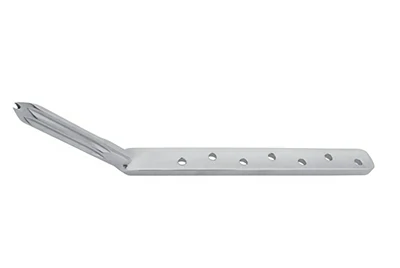
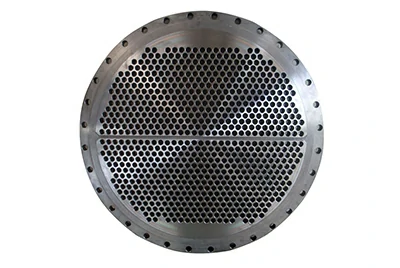
Chalco - High-Quality Titanium Plate Supplier
- Advanced Equipment: We utilize precision rolling and heat treatment lines from Germany and Japan, combined with proprietary processes, to ensure plate shape, flatness, and batch consistency.
- Strict Certification: We are certified to the AS9100/ISO9001 management system. We provide material certification (MTC, EN 10204 3.1) and batch traceability documentation, meeting ASTM B265/AMS 4907/ASTM F136/ISO 5832-3 compliance requirements.
- Full Range of Specifications: We offer a standard thickness range of 0.5-120 mm (available on request, from 0.3-101.6 mm). We support plate widths of 1000/1219/1250/1500 mm × 2000-6000 mm, and can be cut to size according to drawings.
- Delivery Certainty (SLA): Fast shipment of standard parts; transparent scheduling for project parts, expedited delivery; sample production/small batches reduce development risk.
- Total Cost of Ownership (TCO): Precise dimensional control reduces scrap and machining margins, while stable batches reduce inspection and rework costs. Technical support and after-sales guarantees extend throughout the product lifecycle.

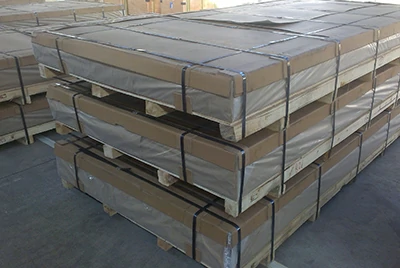
FAQ
Why choose Grade 23 over Grade 5?
Grade 23 (Ti-6Al-4V ELI) has lower interstitial elements (ELI) such as oxygen, nitrogen, carbon, and hydrogen than Grade 5, resulting in higher fracture toughness and improved weld joint performance. If your application involves medical implants, fracture control components, or cryogenic containers, Grade 23 may be more reliable than Grade 5.
Is Grade 23 titanium plate suitable for medical implants?
Yes, Grade 23 is a medical-grade titanium alloy that complies with ASTM F136 / ISO 5832-3. Its high biocompatibility and excellent fatigue life significantly reduce the risk of implant failure and are widely used in orthopedic plates, screws, joint replacements, and dental abutments.
What are the advantages of Grade 23 titanium plate in aerospace applications?
Aerospace applications require material stability at low temperatures and under cyclic loading. Grade 23 complies with AMS 4907. Its high fatigue life and fracture toughness surpass Grade 5, making it ideal for fracture control components and critical structural parts.
Is Grade 23's corrosion resistance suitable for chemical and desalination applications?
Grade 23 retains the excellent chloride and seawater corrosion resistance of Ti-6Al-4V while offering improved weld joint reliability. It is commonly used in heat exchanger tube sheets, reactors, and desalination equipment, extending service life and reducing maintenance costs.
Does Grade 23 titanium plate offer documentation and certification support?
We can provide EN 10204 3.1 Material Certificate (MTC) with our products and support third-party test reports to ensure full compliance with standards such as ASTM B265, AMS 4907, ASTM F136, and ISO 5832-3. For medical and aerospace applications, we also provide full batch traceability and compliance documentation.





